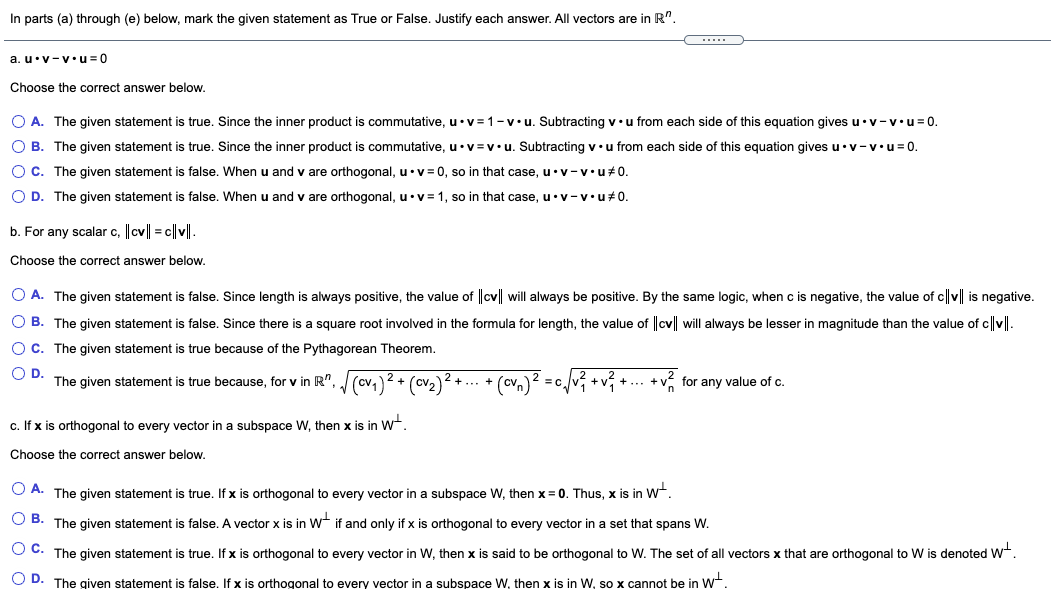
Extracted text: In parts (a) through (e) below, mark the given statement as True or False. Justify each answer. All vectors are in R". (..... a. u•v-v•u= 0 Choose the correct answer below. O A. The given statement is true. Since the inner product commutative, u•v=1-v•u. Subtracting v•u from each side of this equation gives u•v-v•u= 0. O B. The given statement is true. Since the inner product is commutative, u•v=v•u. Subtracting v•u from each side of this equation gives u•v- v•u= 0. O c. The given statement is false. When u and v are orthogonal, u•v = 0, so in that case, u•v-v•u#0. O D. The given statement is false. When and v are orthogonal, u•v= 1, so in that case, u•v-v•u#0. b. For any scalar c, ||cv|| = c||v||. Choose the correct answer below. O A. The given statement is false. Since length is always positive, the value of |cv|| will always be positive. By the same logic, when c is negative, the value of c|v| is negative. O B. The given statement is false. Since there is a square root involved in the formula for length, the value of cv will always be lesser in magnitude than the value of c v. O C. The given statement is true because of the Pythagorean Theorem. OD. The given statement is true because, for v in R", (cv,)2 + (cv2)2 + for any value of c. .... + +... +V c. If x is orthogonal to every vector in a subspace W, then x is in W*. Choose the correct answer below. O A. The given statement is true. If x is orthogonal to every vector in a subspace W, then x = 0. Thus, x is in Wt. O B. The given statement is false. A vector x is in W* if and only if x is orthogonal to every vector in a set that spans W. O C. The given statement is true. If x is orthogonal to every vector in W, then x is said to be orthogonal to W. The set of all vectors x that are orthogonal to W is denoted W. O D. The given statement is false. If x is orthogonal to every vector in a subspace W, then x is in W, so x cannot be in wt.

Extracted text: d. If |u|2 + |v||2 = ||u +v|2, then u and v are orthogonal. Choose the correct answer below. O A. The given statement is true. By the definition of the inner product, two vectors and v are orthogonal if and only if ||u + v|2 = ||u||2 + |v||2. O B. The given statement is false. If |u|2 + ||v|2 = ||u+ v||2, then and v are orthogonal complements. O C. The given statement is true. By the Pythagorean Theorem, two vectors u and v are orthogonal if and only if ||u+ v|2 = ||u||2 + ||v|?. O D. The given statement is false. Two vectors u and v are orthogonal if u•v = 0. If ||u||2 + ||v|2 = ||u+ v||2, then u•v= 1. e. For an mxn matrix A, vectors in the null space of A are orthogonal to vectors in the row space of A. The given statement is V By the theorem of orthogonal complements, (Row A) = V It follows, by the definition of V that vectors in the null space of A V orthogonal to vectors in the row space of A.